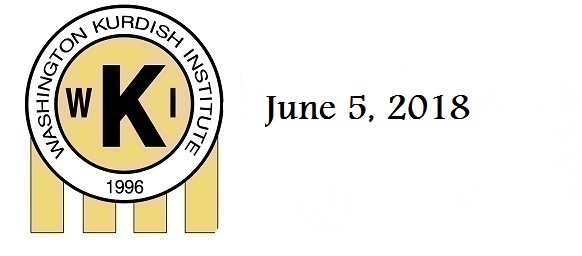981
Iran
- The Iran regime launched more attacks last week on the Kurdish border porters known as Kolbars. On May 31, the Iranian regime border guards shot and killed a Kurdish Kolbar and confiscated all the goods he was carrying in a village by Baneh city near the Iraqi Kurdistan border. Last week in a village near the Sheno district the Iranian regime guards also injured two Kurdish Kolbars. On June 3, more raids took place against the Kolbars in the Marriwan region as the Islamic Revolutionary Guard Corp announced they had orders to shoot any Kolbars, according to Kurdistan Human Rights Association. Another Kurdish Kolbar was reported killed in Oshnavieh- West Azerbaijan Province. The crackdowns against the Kurdish Kolbars have caused several deaths since January 2018 and 144 deaths in 2017.
- After the water crisis started by Iran and Turkey against Iraq, the Iranian Consul General revealed that Iran has agreements with Iraq in regards to seven rivers but does not include the two main rivers in Iraqi Kurdistan. “Sirwan and Little Zab rivers that come to Iraqi Kurdistan from Iranian Kurdistan are not among these seven written agreements,” Iranian Consul General to Sulaimani, Saadullah Masoudian, told Rudaw. Nearly two million people are affected by Iran cutting off the river water to the Kurdistan region.
Iraq
- After the Iraqi government took control of Kirkuk province on October 16 using Iranian-backed militias, for the first time 30-60 thousand oil barrels a day will be exported to Iran from Kirkuk. The Iraqi government announced their agreement with Iran in November of 2017, however logistic issues delayed export until this week. This trade is considered to be a boost for Iran’s economy amid economic crisis in the country.
- The Kirkuk Investigation Court has issued a warrant against the acting head of Kirkuk Provincial Council Rebwar Talabani. After October 16, 2017, the backed Iranian militias raided Talabani’s home and confiscated his personal belongings which resulted is his remaining in Erbil to avoid returning to Kirkuk. In response to the warrant, Talabani said this move is “politically motivated” since he did not break any rules as far as his responsibilities as head of the Provincial Council. The Kirkuk court has accused Talabani of receiving benefits of a head of provincial council while he technically only the acting head of the Kirkuk provincial council.
- Elements of the Turkish army have entered several Kurdish villages in the north of the Kurdistan region. Photos of Turkish military went viral on social media in Kurdistan as they appeared with locals. Earlier Turkey had launched a military operation against the Kurdistan Workers’ Party (PKK) near the Turkish-Iraqi borders. Many Iraqi and Kurdish politicians criticized Turkey for mobilizing their army as much as 30 kilometers into Iraqi Kurdistan under the pretext of fighting the PKK.
Syria
- On June 4, the Turkish Foreign Minister held a meeting with the U.S. Secretary of State Mike Pompeo in Washington. A joint statement said, “ They considered the recommendations of the Turkey-U.S. Working Group on Syria pertaining to the future of our bilateral cooperation in Syria on issues of mutual interest, to include taking steps to ensure the security and stability in Manbij.” On June 5, the U.S. backed Kurdish People’s Defense Units announced the withdrew of the military advisers in Manbij after completing their training the local Manbij Military Council (MMC) in coordination with the U.S. coalition.
- The Syrian Democratic forces (SDF) supported by the U.S.-led coalition continued pushing remaining ISIS groups to the east of the Euphrates between Iraq and Syria by Daishisha village, east of al-Shadadi district in al-Hasakah Province. The U.S.-led coalition announced 225 airstrikes against ISIS in May of 2018 as the SDF pushed on the ground. Meanwhile, Syrian President Bashar Al Assad called upon the U.S. to withdraw their forces from Syria and said the “only” problem they face is the SDF. In response to Assad’s threats, the U.S. State Department responded it would use “necessary and proportionate force” to defend their forces and partners.
- In Afrin, Yazidi families continue to flee the region after Turkish-backed Jihadi groups invaded the region on March 16, 2018. In an interview with the Kurdish Hawar News Agency, a Yazidi family complained about people describing the Yazidis as “infidels” and destroying their holy shrines. In the city of Afrin, protests broke out against the arrests of media activists by the extremist groups, according to the Syrian Observatory for Human Rights.
Turkey
- Last week nationalist mobs attacked members of the Pro-Kurdish Peoples’ Democratic Party (HDP) in Ankara, Istanbul, and Antalya during HDP rallies and election campaigns, leaving many injured and vehicles damaged. These attacks were carried out by “members or supporters of the parties in the AKP-MHP coalition. Sometimes these are happening under the eye of the police forces who actually support these people” said Ayser Basharan the Deputy Co-chair of the HDP. Meanwhile, the Turkish anti-terror police raided several homes of HDP members in Marsin and detained members of the party. Though the snap election on June 24 approaches, HDP Presidential candidate Selahattin Demirtas remains in jail as the Government refused to release him or allow him any interview with Turkish televisions.

